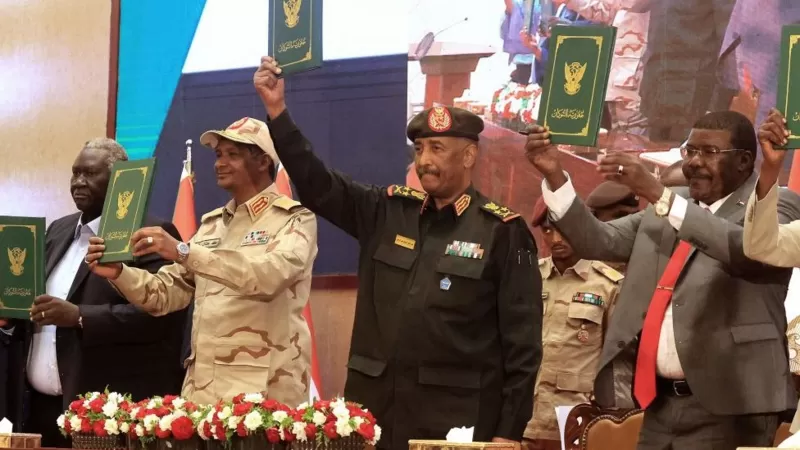l
Military leaders in Sudan have agreed to hand back power to civilian groups in a significant move to end the ongoing political crisis.
A transitional two-year period led by civilian leaders was agreed in a deal unveiled in the capital, Khartoum.
But pro-democracy protesters, who have been staging regular street protests against the army, have rejected it.
Sudan has been gripped by crisis since the army overthrew long-time ruler Omar al-Bashir in 2019.
After his removal in 2019, the military and civilian leaders, represented by a coalition called Forces of Freedom and Change, agreed to form a joint transitional government.
The uneasy union ended late last year when the military overthrew then Prime Minister Abdalla Hamdok.He was reinstated in office earlier this year but resigned following mass protests opposed to his power-sharing deal with the army.
On Monday, there were cheers in the presidential palace in Khartoum after the military generals and civilian leaders signed the latest deal.Miltary leader Gen Abdel Fattah al-Buran appeared to share the audience sentiments when he repeated a popular revolutionary slogan: “The military belongs in the barracks.”However, outside the fortified compound, pro-democracy protesters – mostly young women and men – held marches opposing the deal.”Trust is broken.
The military could do this again,” internationally acclaimed Sudanese filmmaker Hajooj Kuka told the BBC as he prepared to head out to protest.
“The biggest problem is that the leaders of the coup – al-Burhan, his deputy Hemeti – stay in power.
People have been killed, injured, detained [for protesting] and they are going ahead without accountability.”Africa Live: More stories from the continentDespite some reservations, Monday’s agreement, though still short on details, is seen as an initial step to find a solution to the political crisis.
Apart from the two-year civilian led transition, the military has also decided to cede the defence and security portfolio to the civilian prime minister, who has not yet been named.
But there are other key issues yet to be addressed, including getting justice for dozens of anti-coup demonstrators killed by the security forces over the past year.
Rebel groups who backed the army also appear to have been side-lined – the agreement they signed with the government in October 2020 ending decades of civil war could be at risk if not handled well.
Many worry that the army, which will maintain a veto power over government decisions, will wield its influence to destabilise civilian leaders and frustrate the transition to democracy.
But political leaders and the army say those issues will be tackled through further talks.”The goals of the agreement are establishing a fully civilian authority, creating a free climate for politics, and reaching a final agreement with the widest political participation,” Al-Wathiq al-Barir, a spokesman for the Forces of Freedom and Change, told the BBC.
The timeline for a final agreement or when it will be implemented has not been set.
Demonstrators march in a mass demonstration in rejection of a deal aimed at ending the crisis caused by the 2021 military coupI Pro-democracy protesters have rejected the new dealThe African Union, Arab nations and western governments are part of a broad international coalition that has been putting pressure on both sides to negotiate.
The United States and the United Nations have also welcomed the agreement.The UN’s High Commissioner for Human Rights Volker Türk called the deal an “important first step”
.But there is a big gap between the international congratulatory messages, cheers in the presidential palace, and the mood on the streets.
Later this month, Sudan will mark the start of a revolution which led to the overthrow of former President Bashir.
For four years there have been mass protests calling for democratic change which has eluded the country for most of its history since independence.
